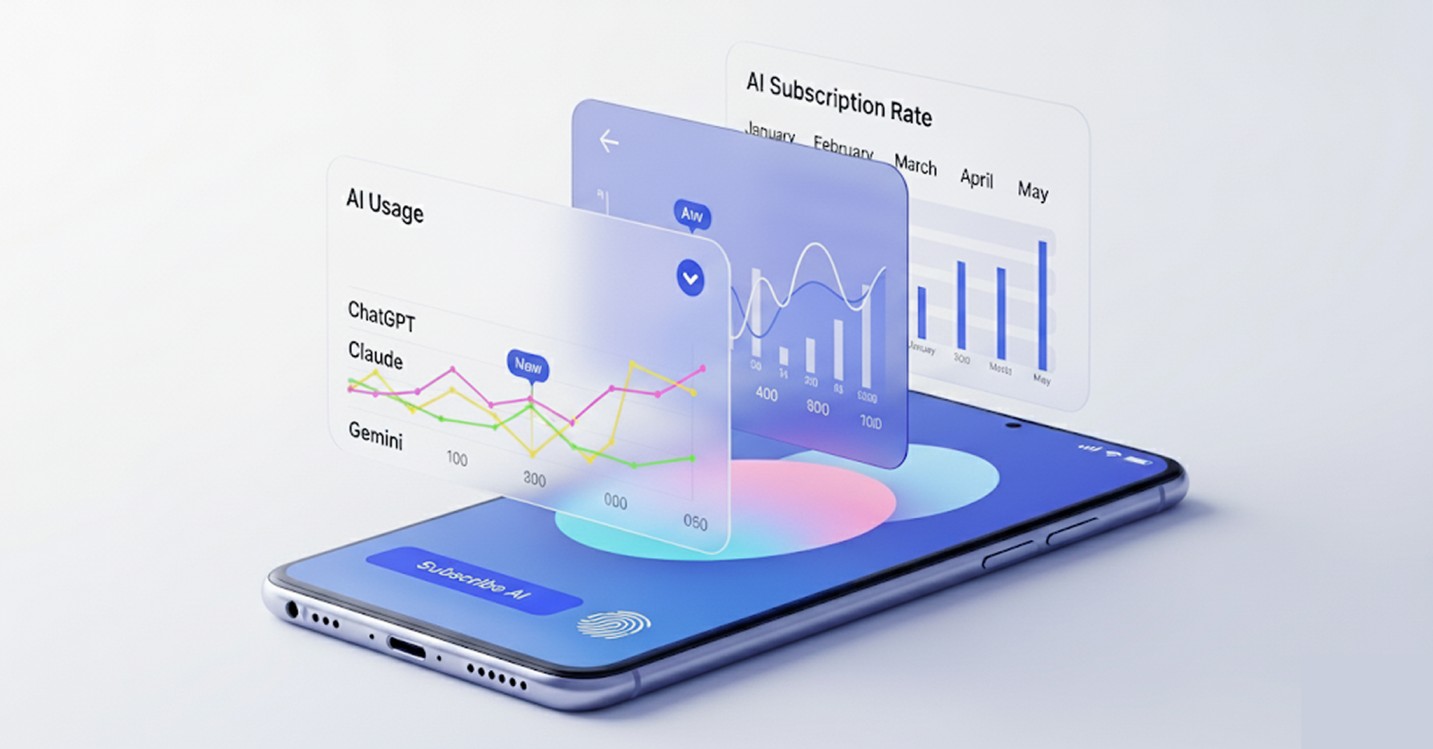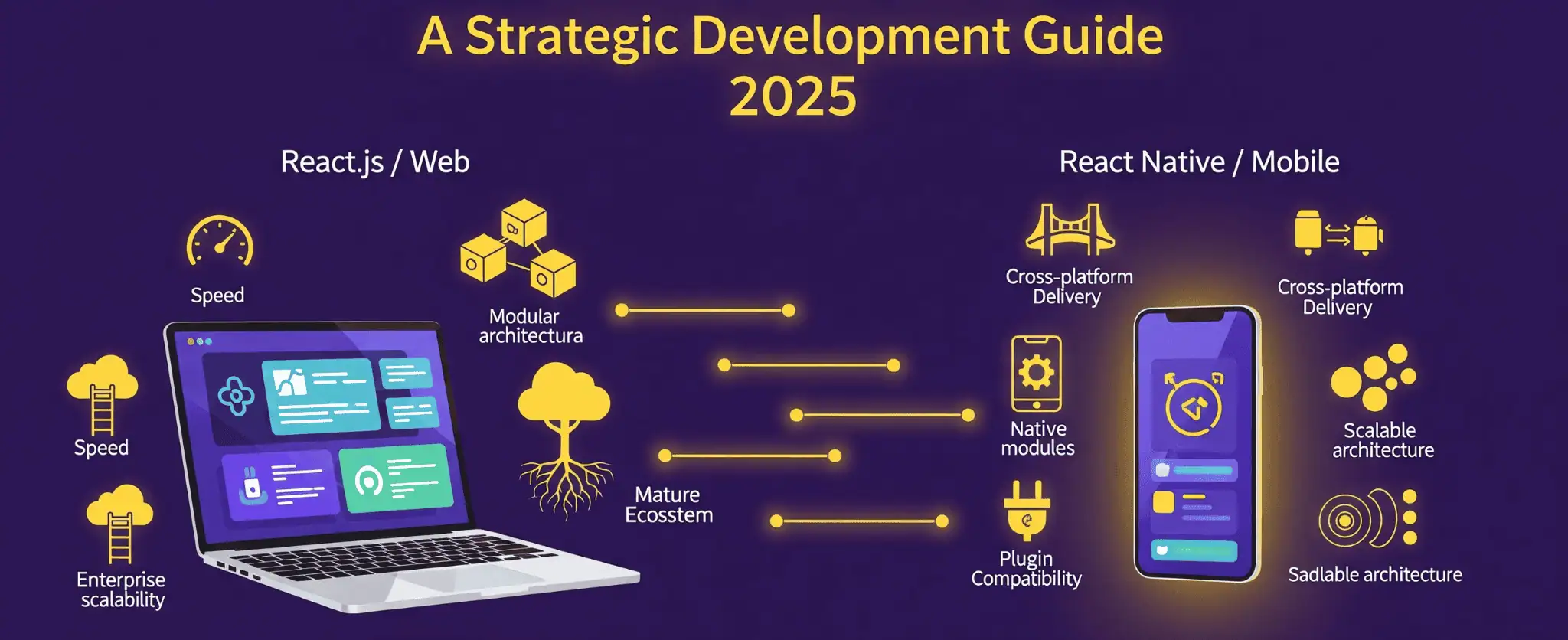
Custom LMS Development with WordPress: Build a Learning Platform
Running a WordPress quiz website is a great way to engage audiences and sell quizzes on niche topics. In fact, WordPress quiz website UX contributes to creating valuable sales leads. However, today’s learners seek structured learning experiences and not just one-off educational tests.
That’s where custom LMS development comes into the picture. For businesses, it means building a learning platform that attracts learners to generate recurring revenue. Whether you’re creating LMS with WordPress or building your own LMS for corporate purposes. Our custom software development company can help you with end-to-end business solutions.
In this blog, we’ll walk you through how to transform a WordPress quiz site into a feature-rich learning platform, helping businesses make a profitable decision.
Why Upgrade from Quiz WordPress Website to Learning Platform?
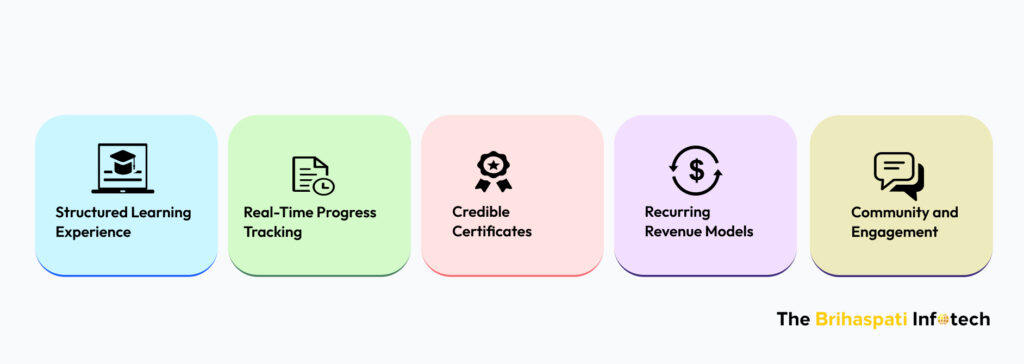
A quiz-only WordPress website has limitations when it comes to generating long-term business value and growth. Hire WordPress developers and turn your quiz site into a feature-rich, custom LMS to unlock several advantages:
- Structured Learning Experience: Students progress through different lessons and course modules.
- Progress Tracking – Students can monitor their performance, while admins get insights into learner activity and completion rates.
- Credible Certificates – Digital badges or certificates provide learners with recognition that adds real value.
- Recurring Revenue Models – Admins can offer subscriptions, memberships, or bundled course offerings.
- Community and Engagement – Discussion forums, gamification, and leaderboards create a more interactive learning environment for students.
In short, while a quiz website captures interest, a learning platform builds loyalty and scales into a sustainable business model.
Core Features of Custom LMS
A robust LMS software elevates user experience and scale with your business. Here are some key features that make LMS a dedicated business solution for edtech and enterprises.
1. Course Creation & Management
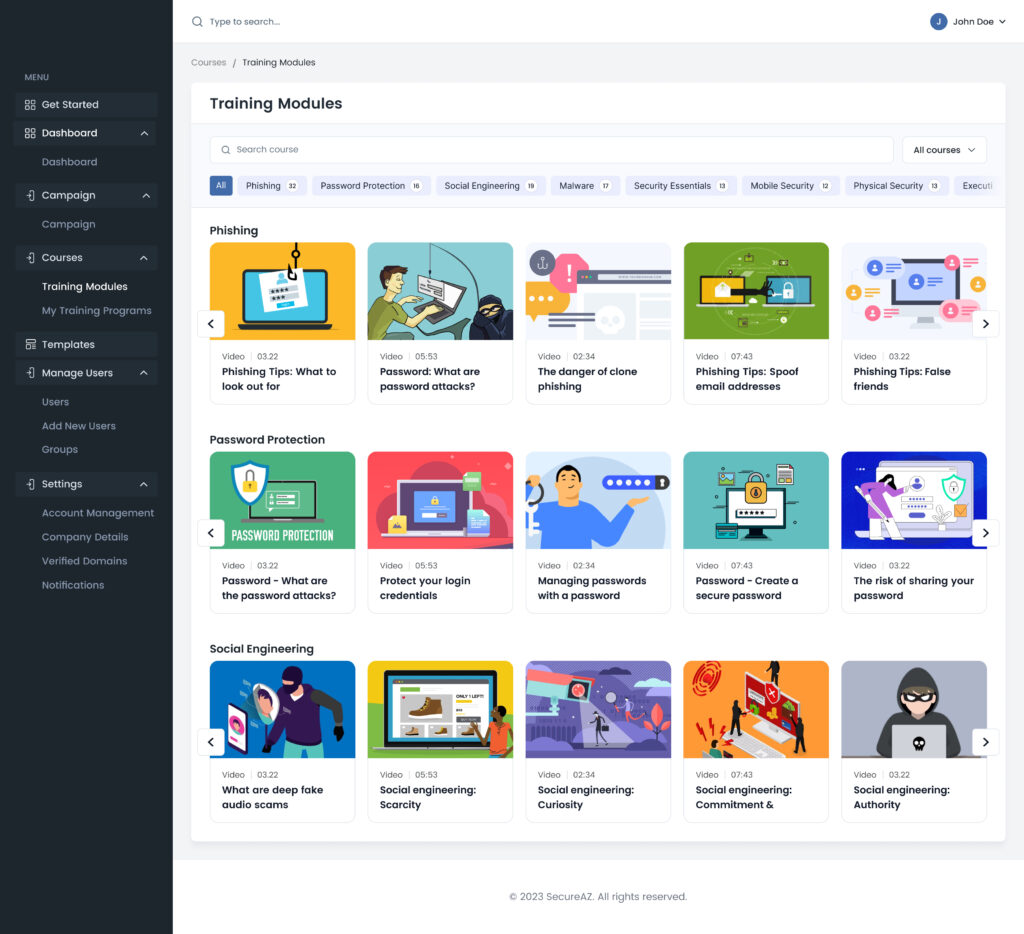
A strong LMS gives admins and instructors control over how learning content is structured and delivered.
- Course Builder: Create and organize courses with multimedia, quizzes, assignments, and downloadable resources.
- Content Management: Easily upload, update, and manage lessons or modules.
- Learning Paths: Design sequential curriculums that guide learners step-by-step.
2. User Profiles & Roles
Different stakeholders need different levels of access to the LMS, making role-based permissions essential.
- Role-Based Access: Define roles like admins, instructors, and students with specific permissions.
- User Profiles: Track learner activity, course history, and achievements in one place.
- Automated Enrollment: Simplify course sign-ups for individuals or groups.
3. Progress Tracking & Analytics
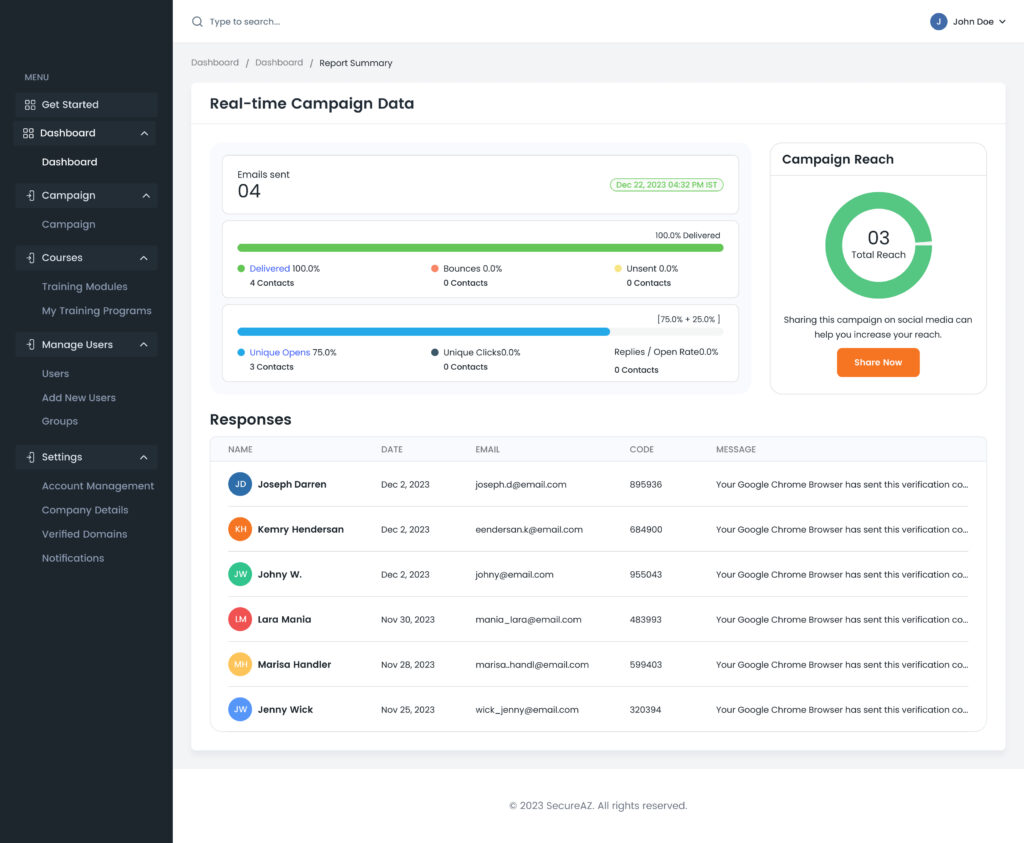
Learners and admins both need visibility into performance and outcomes.
- Performance Metrics: Monitor completion rates, quiz scores, and progress of students.
- Reports & Dashboards: Visualize learning data for actionable performance insights.
- Assessment Tools: Build exams, quizzes, and assignments to measure knowledge retention.
4. Community & Collaboration Features
Learning is more effective when it’s interactive. LMS software enables students to interact with other leaners and instructors.
- Discussion Forums: Create dedicated spaces for learners to share ideas and ask questions.
- Messaging: Direct communication between students and instructors.
- Notifications: Automated alerts for deadlines, new lessons, or course updates.
5. Mobile Responsiveness
Modern learners expect flexibility to use the platform across multiple devices.
- Responsive Design: Ensure seamless access on desktops, tablets, and smartphones.
- Mobile Apps: Extend learning through dedicated Android and iOS apps.
- Offline Access: Allow learners to download lessons or resources for offline study.
6. Payment Integration
Monetization is a core requirement for businesses running an LMS.
- Gateways: Integrate Stripe, PayPal, or WooCommerce for seamless payments.
- Payment Models: Offer one-time purchases, subscriptions, or freemium access.
7. Gamification
Engagement improves when learners feel rewarded by the training platform.
- Leaderboards: Encourage healthy competition to top the list.
- Badges & Points: Award special points for achieving milestones.
- Rewards: Motivate learners to complete more courses.
Custom LMS Development with WordPress: How to Build an LMS from Quiz Website?
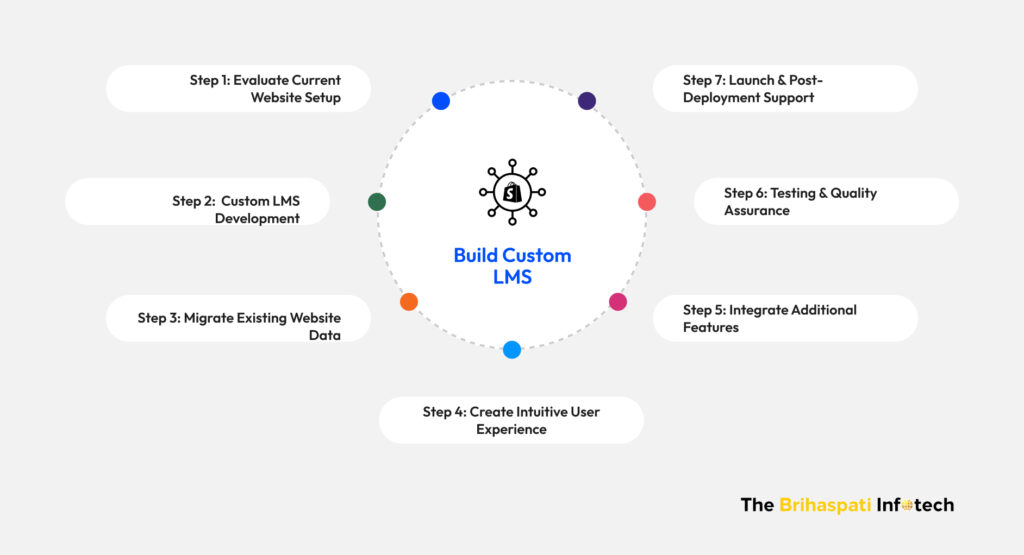
Turning a WordPress quiz website into a full-fledged learning platform requires careful planning and execution. Here are key steps of the custom LMS software development process:
Step 1: Evaluate Current Website Setup
We start with WordPress website audit to find how quizzes are built and whether the current setup is compatible with LMS integration.
- Review installed plugins (e.g., WP Quiz, Quiz Maker, and WPForms).
- Study hosting and server capabilities for handling LMS workloads.
- Identify gaps that might limit scalability or performance.
Step 2: Custom LMS Development
We build a custom LMS tailored to business workflows, branding, and enterprise-level needs. Our full-stack developers ensure flexibility, performance, and long-term scalability:
Frontend (React.js): Develop intuitive dashboards and course libraries with reusable components.
Backend (Node.js + Express) → Handle course management, quiz submissions, user authentication, and progress tracking through secure, scalable APIs.
Database (MySQL or MongoDB) → Store structured learner data including user profiles, quiz scores, enrollments, and certificates.
Integration Layer → Connect with third-party tools like Stripe/PayPal for payments, Zoom/Google Meet for live classes, CRMs/ERPs for enterprise sync.
Advanced Features → Add gamification modules, certificates, AI-driven personalization, and multilingual support for global reach.
Scalability & Security → Deploy on AWS, GCP, or Azure with CI/CD pipelines, ensuring compliance (GDPR, HIPAA) and high availability as user base grows.
Step 3: Migrate Existing Website Data
Our custom website development services ensure every piece of data is migrated safely into the new framework.
- Export quiz data (questions, scores, user attempts) from current plugins.
- Map old quiz formats into LMS-compatible structures.
- Migrate user records (profiles, history, achievements) into the new database (MySQL/MongoDB).
- Validate integrity of learner progress and ensure no duplication or data loss.
This ensures learners retain their history, and admins preserve valuable data analytics.
Step 4: Create Intuitive User Experience
Our React.JS developers rebuild the UI to deliver structured, engaging learning journeys.
- Student Dashboards: Display enrolled courses, quiz history, certificates, and progress metrics.
- Instructor Dashboards: Tools to create lessons, manage quizzes, track learner engagement.
- Course Libraries: Searchable and filterable modules that link quizzes directly with lessons.
- Responsive Design: Optimized layouts for desktop, tablet, and mobile.
Our UX design creates an immersive learning platform experience for all the users.
Step 5: Integrate Additional Features
We add feature-rich modules that elevate learner engagement and monetize the platform.
- Payment Gateways: Stripe, PayPal, or WooCommerce for subscriptions and course sales.
- Certificates & Badges: Auto-generate digital recognition after course or quiz completion.
- Video Learning: Embed recorded video content or enable live sessions with Zoom/Google Meet.
- Gamification: Points, leaderboards, and achievements to improve learner retention.
The feature-rich LMS creates a more dynamic user experience.
Step 6: Testing & Quality Assurance
Before launch, we rigorously test custom LMS software for scalability, accuracy, and reliability.
- Cross-browser & cross-device testing: Deliver consistent experience on different devices.
- Load Testing: Simulate heavy traffic to verify performance under scale.
- Functional Testing: Validate quiz scoring, progress tracking, certificates, and payments.
- Security Audits: SSL setup, database hardening, and compliance checks (GDPR, HIPAA if needed).
Step 7: Launch & Post-Deployment Support
We don’t stop at deployment. Our custom LMS development team ensures the learning platform grows with your business needs.
- Secure Hosting → Deploy on AWS/GCP/Azure with scalability in mind.
- Backups & Monitoring → Ensure uptime and quick recovery.
- Continuous Support → Bug fixes, new feature rollouts, plugin/API updates.
- User Feedback Loop → Collect insights from learners and admins to improve the platform iteratively.
Post-launch, your LMS stays optimized, secure, and future-proof.
Business Benefits of Custom LMS Development with WordPress
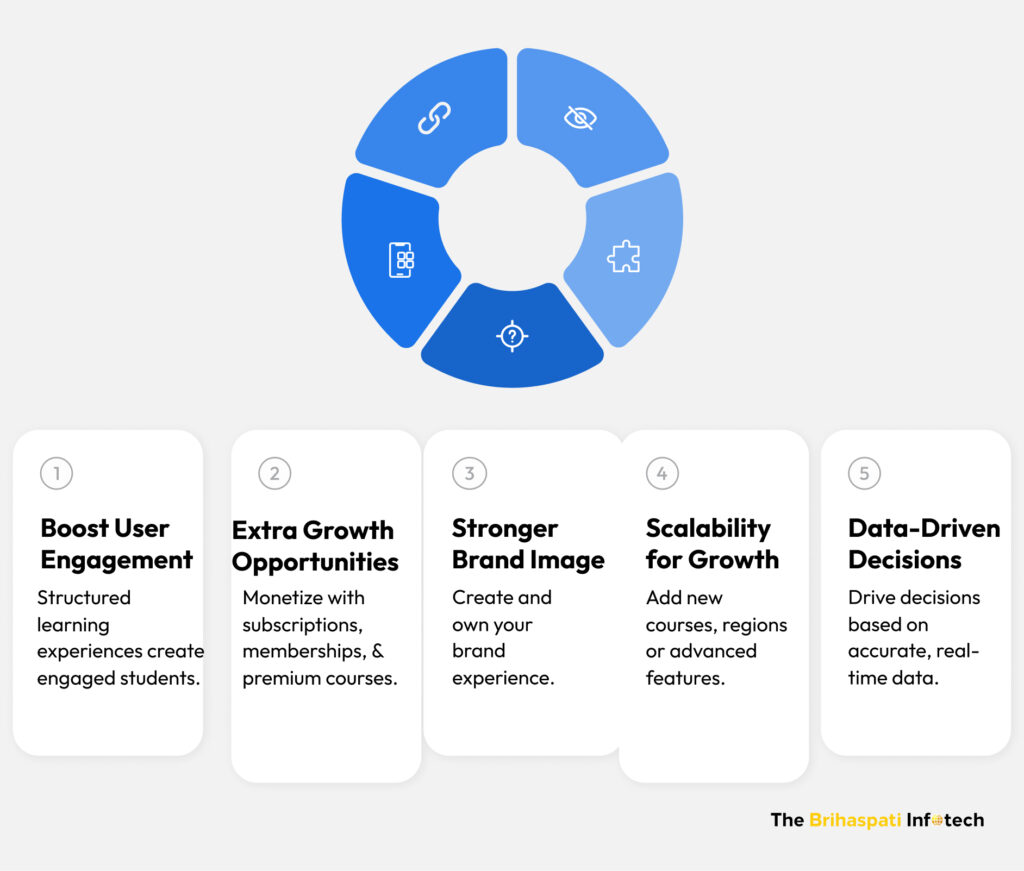
Converting a WordPress quiz site into a full-fledged learning platform doesn’t just enhance the user experience — it delivers clear business value.
1. Increased User Engagement & Higher Course Completion
- Structured learning experiences help students stay motivated.
- Features like gamification, personalized course recommendations, and progress tracking encourage learners to complete courses.
2. Extra Growth Opportunities
- Go beyond selling quizzes. Monetize with subscriptions, memberships, and premium courses.
- Offer freemium models where basic quizzes are free but advanced courses require payment.
3. Stronger Branding Image
- Unlike relying on third-party e-learning marketplaces, a custom LMS lets you to create and own the brand experience.
- Tailor design, features, and workflows to reflect your unique value proposition.
4. Scalability for Growth
- As your learner base grows, a custom LMS can adapt.
- Add new courses, support new regions, and integrate enterprise-grade features like compliance training.
5. Data-Driven Decisions
- With analytics dashboards, admins can track learner performance, course popularity, and overall platform ROI.
- These insights help refine courses, marketing strategies, and revenue models.
With custom LMS development, you not just upgrade from simple WordPress quiz website. But you are building a smart learning platform to multiply user engagement and conversion.
Frequently Asked Questions
A plugin-based LMS (like Tutor LMS) can be budget-friendly. However, custom LMS development involving gamification, video integration and AI require a larger investment.
We calculate the cost for developing a custom LMS depends after studying several factors, including
1. The solution’s architecture
2. The functional scope
3. The development tech stack
4. The custom requirements
Contact Us
Typically, simple quiz website to LMS upgrades can take 4–6 weeks. However, custom LMS builds with advanced features (certifications, payments, live classes) may take 6-10 weeks.
WordPress LMS plugins are great for quick setups. However, custom LMS development is recommended for businesses looking for scalability, unique branding, and advanced features.
Yes, absolutely. Quizzes, user data, and results from your current site can be migrated into the LMS framework without losing progress or content.
Yes. We can extend platforms like Shopify, WordPress, or Webflow with a custom LMS layer, or migrate your site into a purpose-built LMS.
Ready to Build your own LMS?
A quiz-only WordPress site increases user engagement, but a custom LMS transforms that engagement into structured learning, measurable progress, and long-term business growth.
At The Brihaspati Infotech, we build custom LMS software for your business goals. Whether you’re looking to migrate from existing CMS or build an advanced learning platform from scratch, our team ensures a smooth transformation.
Ready to launch your own learning platform? Let’s build a custom LMS that stands out.
Stay Tuned for Latest Updates
Fill out the form to subscribe to our newsletter



